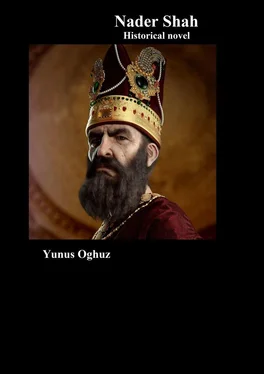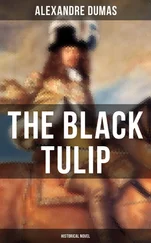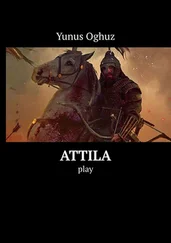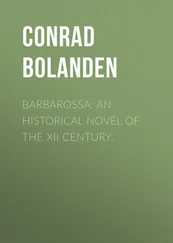Ismayil bey took the covering off the tray that the servant was holding. A sword was on the tray, decorated with precious stones and an atlas dressing-gown sewn with golden threads. Ismayil bey gave the tray to the servant who was standing near the emperor. The other servants went out.
– Our Shah ordered me to tell you that the Safavids always lived with the Russians in peace and friendship. Starting from now he wants to live in the same way.
Peter the Great looked firmly into the eyes of Ismayil bey and forthrightly spoke about the main purpose:
– What does your Shah want?
– Our Shah wants you, being a great emperor, to recognize him as the Shah; to assist our Shah in the troubled days of our state.
– Well, suppose we recognized Tahmasb Mirza as the Shah. What does Russia gain out of it?
– You may know this, Your Highness!
Peter the Great thought screwing up his eyes and then said:
– We shall agree with you under the following conditions:
– Darband, Baku, and their suburbs remain in the structure of Russia.
– The seashore provinces of Gilan, Mazandaran and Astarabad pass to Russia’s control.
– The state, which is our friend, becomes your friend; the state which is our enemy becomes your enemy too.
– Russian merchants can trade in your territory without paying tax and they can go to Delhi and other countries without paying tax.
With all these condi tions the Russian Empire undertakes the followings:
– Recognizes Tahmasb as the Shah of the state of Safavids;
The Russian state will assist in suppressing any revolts which happen inside the state of the Safavids.
The interpreter was translating slowly, without any pause, translating the words which the emperor said to Ismayil bey. When he finished translating the silence was broken by Peter the Great:
– Did the Shah of Safavid give you responsibility to dis- cuss all these problems and sign the documents?
Ismayil bey answered:
– Yes, Your Highness!
– In this case it would be interesting to know your attitude to these conditions.
For Peter the Great the third paragraph was important, because that paragraph didn’t allow the uniting of the Ottomans with the Safavids. If they signed a peace treaty, without fail the opinion of Russia was to be taken into consideration. Practically, Peter the Great made the Safavids fall into a political trap. Peter the Great supposed that the messenger would think a lot but would understand nothing. But Ismayil bey dispersed this supposition of the emperor:
– Your Highness, I agree with your conditions, but it is necessary to add one word to the responsibility from your side.
– Which word?
– In the second paragraph instead of the word of “military” there must be written “military and financial”.
Peter the Great had already gained a diplomatic victory over the Ottomans by means of the Safavids. Now whatever the messenger of Safavids wanted he would give. That was why he said with indifference:
– Let it be how you want, messenger of Safavids! – Tonight we are going to sign a treaty about “friendship and brotherhood”. After the official signing, tomorrow you may take the first financial assisiance- ten thousand pieces of Russian gold.
To get the unexpected assistance and by means of it to strengthen the army of the Shah made Ismayil bey rejoice:
– All right, Your Highness!
Peier the Great had achieved his main purpose. His main purpose was to turn the Caspian Sea into a Russian basin and not to let the Ottomans to the west of the Caspian Sea. That was why he became cheerful. In order to test the mind of Ismayil bey, he wanted to make him speak once again:
– Both the Safavids and the Ottomans are from the same stock. Why don’t you find a common language? Half of the world is under your control. You fight against yourselves. What can’t you share?
Ismayil bey answered without thinking:
– For faith and lands, Your Highness!
– I understood the meaning of faith, but why for “lands”?
– Both the Otiomans and the Safavids are the Oghuz Turks. Azerbaijan and Anatolia are the motherland of both of them. They say that Azerbaijan and Anatolia are their motherl and, but we say that Azerbaijan and Anatolia are ours and we have been living here for thousand years. They don’t want to agree with us…
Peter the Great smiled at the naive words of Ismayil bey and said nothing.
Addition:
On June 24 in 1724 as a result of the efforts of the ambassador of Russia in istanbul, Nepluyev and the ambas- sador of France, Markiz de Bonak, a treaty was signed between the Ottomans and Russia about the division of the north and west parts of the state of Safavids. According to that treaty a straight line from the place where Kur and Araz joined till Hamadan, from the south part of Dagestan including the east part of Shamakhy were considered the borders of Russia and the Ottomans. According to the document, the Ottoman and Russia empires would recognize Tahmasb Mirza as the Shah. If the Shah recognized that treaty, they would assist him in restoring orders in the state of the Safavids.
But Tahmasb Shah didn’t accept such a shameful treaty and the conditions shown there. That was why under the leadership of Ahmad pasha, the Ottomans firstly occupied Khoy, then Hamadan, then Nakhchivan and Irevan. The Ottomans who were not able to conquer Tabriz entered Ganja. Tahmasib Shah returned to Ardabil when the second attack on Tabriz was successful.
“…I knew that the situation was worse. My beauti ful Azerbaijan was conquered by the Russians and the Ottof mans; there began a revolt in the empire which had been left to us like a heritage. Now the ruler of each city behaved like the Shah. Be fore my eyes I was losing my country. “What must be done?” – That question always made me think. It was necessary to put an end to this lack of overall control. In order to join Azerbaijan and other lands in unity Tahmasb Shah made more efforts, but there was no result.
I made up my mind that it was necessary to create a strong army. Firstly, in Kalat I gathered one group of troopers about two thousand, consisting of the Avshars. I began to teach them the tactics of fighting, the ways to go forward, to retreat. To my mind, I achieved my purpose. Within a short time, I was able to create a group of regulated troopers. It stimul ated me to other great fights. Kalat was between the trenches like hills and valleys. It was my first fortress. It was necessary to test the fighting ability of the group by leaving Kalat. We attacked Khorasan. The fighters exactly fulfilled all my orders. We plundered Khorasan and returned Kalat with much plunder. At that time, Melik Mahmud Sistani didn’t miss the chance because of lack of control in the country. He occupied Meshed and declared him self an in de pend ent ruler.
Tahmasb Shah couldn’t get back Isfahan from Ashraf khan. Though he attacked the city with Fatali khan, Ashraf khan made them retreat.
One day a man by the name of Nasir agha came to me. He was originally Kurd. After greeting me he explained the purpose of his coming:
– Nader khan, I have come to you like a representative.
– Please, I am listening!
– It is necessary the Kurds and the Avshars are combined and become one troop or if they remain separate Melik Mahmud will make us surrender…
He was speaking wisely. I didn’t hide my thoughts and said:
– Nasir agha, I also think like you… – If there is no uniting they will kill not only us but also they will destroy our motherland…
He was glad to hear my words as if he didn’t expect me answering thus.
– It is right, Nader khan! In such troubled days we must unite. We discussed this and then decided that you must be the warlord of our fighters.
Читать дальше












